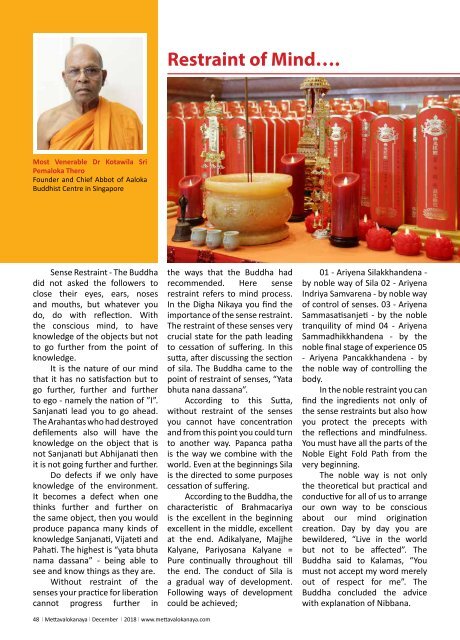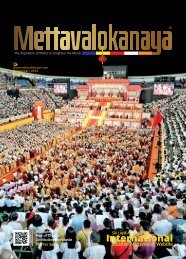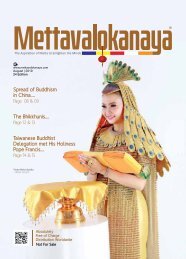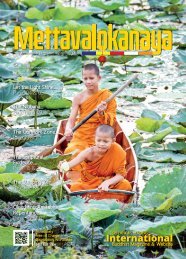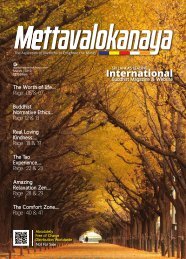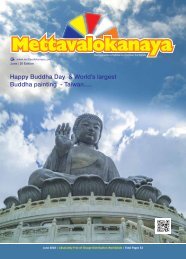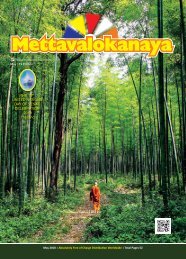Mettavalokanaya_Buddhist_Magazine_December_2018.
“Mettavalokanaya” International Monthly Buddhist Magazine has been successfully distributed to 40 countries including all districts across Sri Lanka and now “Mettavalokanaya” is Sri Lankan Most Popular & Leading monthly Buddhist Magazine.
“Mettavalokanaya” International Monthly Buddhist Magazine has been successfully distributed to 40 countries including all districts across Sri Lanka and now “Mettavalokanaya” is Sri Lankan Most Popular & Leading monthly Buddhist Magazine.
You also want an ePaper? Increase the reach of your titles
YUMPU automatically turns print PDFs into web optimized ePapers that Google loves.
Restraint of Mind….<br />
Most Venerable Dr Kotawila Sri<br />
Pemaloka Thero<br />
Founder and Chief Abbot of Aaloka<br />
<strong>Buddhist</strong> Centre in Singapore<br />
Sense Restraint - The Buddha<br />
did not asked the followers to<br />
close their eyes, ears, noses<br />
and mouths, but whatever you<br />
do, do with reflection. With<br />
the conscious mind, to have<br />
knowledge of the objects but not<br />
to go further from the point of<br />
knowledge.<br />
It is the nature of our mind<br />
that it has no satisfaction but to<br />
go further, further and further<br />
to ego - namely the nation of ”I”.<br />
Sanjanati lead you to go ahead.<br />
The Arahantas who had destroyed<br />
defilements also will have the<br />
knowledge on the object that is<br />
not Sanjanati but Abhijanati then<br />
it is not going further and further.<br />
Do defects if we only have<br />
knowledge of the environment.<br />
It becomes a defect when one<br />
thinks further and further on<br />
the same object, then you would<br />
produce papanca many kinds of<br />
knowledge Sanjanati, Vijateti and<br />
Pahati. The highest is “yata bhuta<br />
nama dassana” - being able to<br />
see and know things as they are.<br />
Without restraint of the<br />
senses your practice for liberation<br />
cannot progress further in<br />
the ways that the Buddha had<br />
recommended. Here sense<br />
restraint refers to mind process.<br />
In the Digha Nikaya you find the<br />
importance of the sense restraint.<br />
The restraint of these senses very<br />
crucial state for the path leading<br />
to cessation of suffering. In this<br />
sutta, after discussing the section<br />
of sila. The Buddha came to the<br />
point of restraint of senses, “Yata<br />
bhuta nana dassana”.<br />
According to this Sutta,<br />
without restraint of the senses<br />
you cannot have concentration<br />
and from this point you could turn<br />
to another way. Papanca patha<br />
is the way we combine with the<br />
world. Even at the beginnings Sila<br />
is the directed to some purposes<br />
cessation of suffering.<br />
According to the Buddha, the<br />
characteristic of Brahmacariya<br />
is the excellent in the beginning<br />
excellent in the middle, excellent<br />
at the end. Adikalyane, Majjhe<br />
Kalyane, Pariyosana Kalyane =<br />
Pure continually throughout till<br />
the end. The conduct of Sila is<br />
a gradual way of development.<br />
Following ways of development<br />
could be achieved;<br />
01 - Ariyena Silakkhandena -<br />
by noble way of Sila 02 - Ariyena<br />
Indriya Samvarena - by noble way<br />
of control of senses. 03 - Ariyena<br />
Sammasatisanjeti - by the noble<br />
tranquility of mind 04 - Ariyena<br />
Sammadhikkhandena - by the<br />
noble final stage of experience 05<br />
- Ariyena Pancakkhandena - by<br />
the noble way of controlling the<br />
body.<br />
In the noble restraint you can<br />
find the ingredients not only of<br />
the sense restraints but also how<br />
you protect the precepts with<br />
the reflections and mindfulness.<br />
You must have all the parts of the<br />
Noble Eight Fold Path from the<br />
very beginning.<br />
The noble way is not only<br />
the theoretical but practical and<br />
conductive for all of us to arrange<br />
our own way to be conscious<br />
about our mind origination<br />
creation. Day by day you are<br />
bewildered, “Live in the world<br />
but not to be affected”. The<br />
Buddha said to Kalamas, “You<br />
must not accept my word merely<br />
out of respect for me”. The<br />
Buddha concluded the advice<br />
with explanation of Nibbana.<br />
48 l <strong>Mettavalokanaya</strong> l <strong>December</strong> l 2018 l www.mettavalokanaya.com www.mettavalokanaya.com l 2018 l <strong>December</strong> l <strong>Mettavalokanaya</strong> l 49


